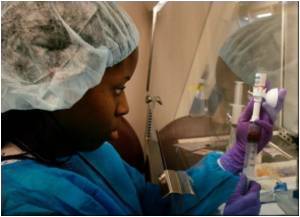The lack of effective therapeutic options is a problem for pancreatic cancer patients as more than 38,000 people in the United States die of the disease each year
The lack of effective therapeutic options is a problem for pancreatic cancer patients as more than 38,000 people in the United States die of the disease each year, and new drugs and treatments are desperately needed.
For almost three decades, scientists and physicians have known that a gene called the KRAS oncogene is mutated in virtually all pancreatic cancers, making it an important target for scientists looking for a way to stop the growth of pancreatic cancer tumors. The problem is that the KRAS gene triggers cancer cell growth in numerous ways, through multiple cell signaling pathways, and scientists have had difficulty determining which one will be the most promising to block – an important first step in designing a drug for use in patients.In a paper published today in the Journal of Biological Chemistry, a team from UNC Lineberger Comprehensive Cancer Center has narrowed the focus of this scientific quest to a protein called RGL2.
According to Channing Der, PhD, who led the research, "The pathway we talk about this paper is one we have investigating for more than five years. We think it is an attractive target for achieving what has, to date, been impossible: making a KRAS-blocking drug."
Der, who is a distinguished professor of pharmacology and UNC Lineberger member, says, "We are particularly optimistic about RGL2 because we know that this protein is a critical component of KRAS signaling to another class of proteins called Ral GTPases, which are essential for the growth of almost all pancreatic tumors."
Working with Jen Jen Yeh, MD, assistant professor of surgery, Sharon Campbell, PhD, professor of biochemistry and biophysics, Der and his laboratory team were able to demonstrate that RGL2 is overexpressed – not only in pancreatic tumor cells grown in the laboratory but also in tissue taken from pancreatic cancer patients.
According to Der, "Many ideas work in the artificial environment of cell culture but not in real cancer patients. Our work with actual pancreatic tumor tissue makes us optimistic that our new understanding of this pathway can lead to a therapeutic impact for the cancer patient."
Advertisement
Source-Eurekalert














